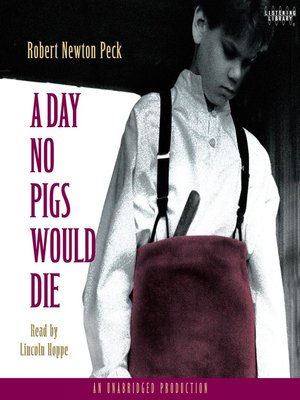

They can't see how I true a beam to build our barn, or see that the rows of corn in my field are straight as fences. Men who only see my mark, my X, when I can't sign my name. "Men who look at me and take me not for what I be. Even when he's proved his back is strong. When a man cannot do these things, people think his head is weak. "No, it's account of I can't read or write. "Then why can't you vote? Is it because you're a Shaker?"

Its view of life is embodied in the character of his young protagonist's father, who believed that a faith is more blessed when put to use than when put to word: "A man's worship counts for naught, unless his dog and cat are the better for it.“Aren't you a Republican? Just about everyone is in the whole town of Learning." Like the Vermont folk he writes about in his novel, he was raised as a boy in the Shaker Way, which endured even after the sect itself had died out. Robert Newton Peck comes from generations of Yankee farmers. For boys of this age and for the young of any age."- School Library Journal. "With plenty of Yankee common sense and dry wit, and some pathos as the boy at 13 takes on the duties of a man.

Love suffuses every page.”– The New York Times “You’ll find yourself caught up in the novel’s emotion from the very opening scene. It is small, accepting and loving and it succeeds perfectly.”– Boston Globe Honest, moving, homely in the warm and simple sense of the word. Every page is suffused with wit and charm and glowing with warmth.”– Newsweek

“Reading this book is like sipping hot cider in front of a crackling potbellied stove. The result is a moving coming-of-age story that still resonates with teens today. In it, author Robert Newton Peck weaves a story ofĪ Vermont boyhood that is part fiction, part memoir. Originally published in hardcover in 1972, A Day No Pigs Would Die was one of the first young adult books, along with titles like The Outsiders and The Chocolate War.


 0 kommentar(er)
0 kommentar(er)
